#shipwright september
Explore tagged Tumblr posts
Text


March 17th 1473 saw the birth of King James IV at Stirling Castle.
James IV was arguably the most successful of all the Stewart rulers of Scotland. Two decades after his death, Sir David Lindsay of the Mount, who had known the king well, described him as ‘the glory of all princely governing’, a view which is largely substantiated by contemporary witnesses, most strikingly by the Spanish ambassador, Don Pedro de Ayala, in 1498. A combination of luck, military prowess, skilful use of royal patronage, and shrewd diplomatic manoeuvring explains King James's success.
The eldest son of James III and Margaret of Denmark, James was the figurehead in a successful rising against his father in 1488 which ultimately led to an act of regicide and patricide, he undertook elaborate penances to atone for his role in James III's death for the remainder of his life—the iron belt worn around his waist was no invention of later chroniclers.
Yet the young king benefited greatly from the manner of his accession, for he was assisted by a very wide spectrum of magnates who had found his father's rule unacceptable.
By the end of James IV's reign, the royal council displayed a much broader territorial representation than had ever been known under the king's three predecessors, embracing the crown's greatest subjects, including Hepburn, Hume, Angus, Argyll, Lennox, Arran, and Huntly. And at the outset of James IV's personal rule, in the spring of 1495, there was no violent political upheaval, but a smooth transition—the king, a late developer, was already 22. He signed the Treaty of Perpetual Peace with Henry VII of England that went some way to ease the traditional enmity between the two nations. To cap the new warm relations with the old enemy James married Henry's daughter, Margaret Tudor in 1503.
His expenditure on building, especially on Holyrood palace and the King's House and great hall at Stirling castle, was large, his lavishing of money on a royal navy was spectacular. An insight into James's court is provided not only by the treasurer's accounts (which survive in some quantity from this reign), but also by the poetry of William Dunbar, who under the King saw his pension increase from £10 in 1500 to a generous £80 by 1510
James IV also recognised that parliaments were often a focus for criticism (or worse) of the crown, he called only three in the seventeen years of his adult rule.
It was the support of the French that was James downfall, we may well blame just the Auld Alliance, but under him it was probably utilised more than other Scottish monarchs, he used France shipwrights, soldiers, ships, money, and munitions. Significantly James's fleet started taking shape late in 1502, the year of the English treaty; and in the war of 1513, it was to be paid for by the king of France. A naval race with the English resulted in the construction of the Scottish Margaret followed by the English Mary Rose; and in October 1511 James attended the launch at Newhaven of the Michael, the largest warship in northern Europe.
When the young Henry VIII sought to renew the Hundred Years War in 1512–13, James made a formal treaty with Louis XII, employed crusading language to justify his cause, accepted excommunication with equanimity, invaded England, and took Norham castle by storm (while the Scottish fleet attacked Carrickfergus in Ulster en route to France).
On 9th September 1513 James rashly committed himself to battle against the earl of Surrey at Flodden and was killed, together with no fewer than nine of his earls, and thousands of his subjects, a striking if tragic reflection of his popularity in Scotland.
9 notes
·
View notes
Text
September Doodle Dump GO!
I think I'm honestly gonna try and do doodle dump posts more often, especially since I've started college now and don't have as much time or energy for. Bigger pieces of art lol. Once again, everything under the Read More :]
(This is far from everything, but it would be countless reblogs if I tried to put everything in, so. Imma just be selective.)
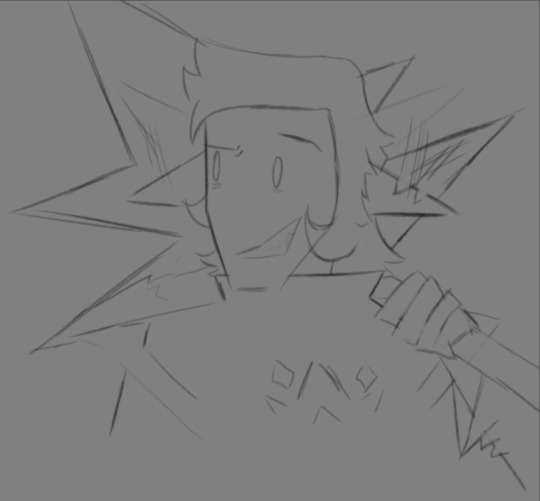

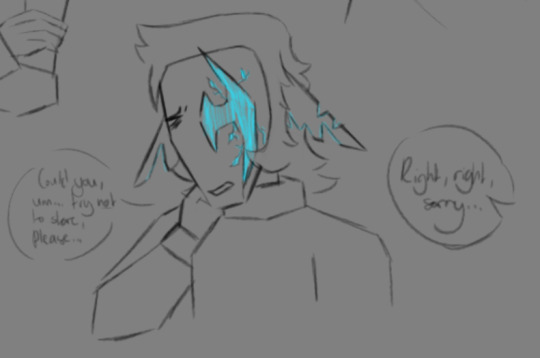
First off, younger Wounded Warrior hcs :] (This ties in with my hcs that they're a defector from the King's army, this was in their early months as a Wasteland soldier after escaping)

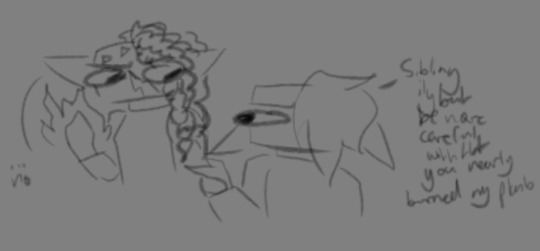
Cannoneer my BELOVED (plus silly sibling interaction lol)
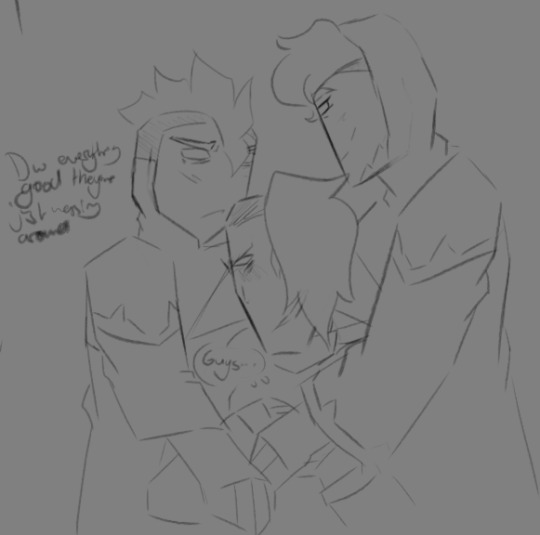
Well. Uh. You know how I'm all for Wounded/Slouching. Yeah I added Shipwright to the mix. I'm not sorry.
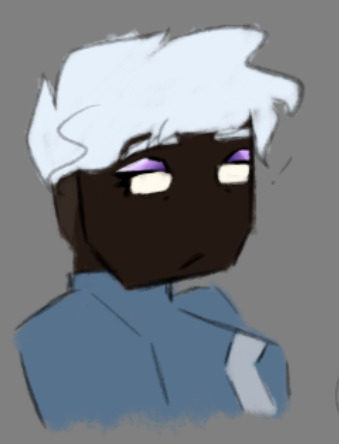
I like to imagine Rainier (my Slouching) does makeup from time to time :] (to add to that, I actually hc that they do drag as a hobby, but. I also haven't made how they look in drag yet because I'm currently struggling with how the fuck they'd style their wigs)

Remembrance Guide my BELOVED (i've named them Uvadus <3)
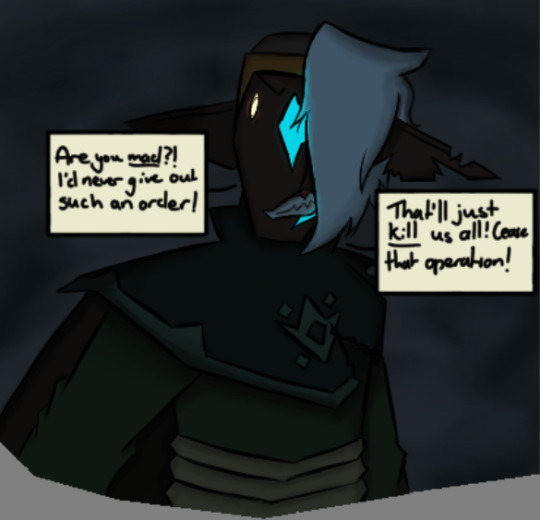
THIS!!! This was my first time using multiply layers and I'm happy with how it turned out, even if it's simplistic :3 (It only just hit me that both Uvadus and Mur have EXTREMELY similar expressions between their doodles dear god)

And, lastly, some modern au doodles for Murtagh (my wounded warrior) <3
I personally hc them to have chronic pain from injuries and other issues they sustained during their time in the army in canon, and that naturally transferred over into me hcing that, at least in a modern au, they absolutely would use a wheelchair to get around as they find it most suitable for them. Crutches are another option but aren't used as often, and if they do, it's either mainly around the house or for shorter distances.
#jupiter's radiation || art tag#the words of the stars || ramble tag#sky: children of the light#sky: cotl#sky cotl#sky: children of the light fanart#sky: cotl fanart#sky cotl fanart#wounded warrior#slouching soldier#slumbering shipwright#cackling cannoneer#remembrance guide#season of remembrance#season of the little prince#season of abyss#sky cotl modern au#why the FUCK do i keep putting so many tags#it's gone 11am on october 1st i am a tad bit late but also this works anyways#college is kicking my ASS rn#but i think i'll survive#but MAN why are the days so long for accounting#fucking dies#oh my god the quality of the coloured ones got CRUNCHED wtf tumblr
15 notes
·
View notes
Text
Ace Albatross Albert Alpha Alphabet Apple April Archer Argentum Artist August Aurum Autumn Banana Barrel Binoculars Black Blank Boar Book Bracket Bravo Broadway Builder Bull Butter California Camouflage Captain Cardinal Charlie Christian Cliff Climatic Clutch Coconut Condor Copper Crow Crusader December Delta Dog Doorknob Dragon Drake Duck Eagle Echo Egg Einstein Equator Fall Father February Ferrum Fox Foxtrot Garage Gentleman Glass Globe Golden Golf Goodyear Goth Grapes Gray Green Gull Halberd Ham Hammer Hawk Helium Holdover Holler Honey Hotel Hottie Howitzer Hunter India Iron Jackal Jackdaw Jalapeno Jam Jamboo January Jay Jock Joker Juliette July June Junior Kilo Knight Knowledge Komodo Krypton Lima Loki Lucky Lung Main Maniac March Marked Marksman Master May Metal Mike Mug Musician Mutt Neon Night Nitro November Octane October Odor Orange Order Oscar Ox Page Paladin Palladium Papa Paper Parachute Peach Pepper Pink Polar Preacher Purple Quebec Quest Question Questor Rainbird Raven Red Redo Rock Romeo Sage Salamander Salt Sandpaper Sandstone Scissors Scotch Scott Seagull September Serious Shipwright Sierra Silver Skeleton Sleeve Soldat Sortof Space Sparrow Speed Spice Spring Spy Spyglass Squirrel Standard Stapler Steel Stink Stone Stormtrooper Strider Sugar Summer Tango Technic Techno Templar Theseus Timeless Tropic Undo Uniform Unique Vacuum Victor Vodka Wanderer Whiskey Whisper White Winter Wisdom Wise Wolf Writer X-Ray Xenon Yak Yankee Yellow Zebra Zulu
1 note
·
View note
Text

Frances Mary Albrier (September 21, 1898 – August 21, 1987) was a civil rights activist and community leader who was born in Mount Vernon, New York. In 1938 became the first woman elected to the Alameda County Democratic Central Committee. She founded the East Bay Women’s Welfare Club whose goal was to get African American teachers hired in the Berkeley schools. This campaign saw success with the hiring of Ruth Acty in 1943. Her political involvement was driven by the reality that African Americans were “taxpayers without any representation in the city government or the schools of Berkeley. That was the message I wanted to get over to them.” In 1942 she challenged racial and gender barriers in wartime Kaiser Shipyards in Richmond. She completed a welding course with twice the required hours because “I felt I had to be better because I was a Black woman,” and passed the welder’s test “with flying colors,” but her application was rejected by the Boilermakers Union in the shipyards because Kaiser “had not yet set up an auxiliary [union] for Negroes.” Bowing to her threat of a lawsuit and pressure from the African American community, the Richmond union agreed to accept her dues and transfer them to an auxiliary in an Oakland shipyard.
She became the first African American woman to be hired at Shipyard #2 in Richmond. Reporting to work outfitted in welder’s regalia, her presence amazed the Black shipwrights. She explained, “Well, I just happened to bust my way in here.” She remained at the forefront of the fight to end auxiliaries and saw success with the 1945 James v. Marinship decision that outlawed auxiliaries. She continued the fight for equality and social justice throughout her life. She received numerous awards for her lifetime of service, including the NAACP’s “Fight for Freedom Award,” and a citation from the California State Assembly for her “outstanding record of achievements in public service.” #africanhistory365 #africanexcellence
0 notes
Text
Title: Morfydd Clark Reveals Exciting Details About Galadriel's Story in Rings of Power Season 2
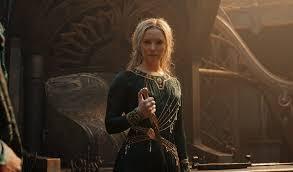
Title: Morfydd Clark Reveals Exciting Details About Galadriel's Story in Rings of Power Season 2 Morfydd Clark Reveals Exciting Details About Galadriel's Story in Rings of Power Season 2 When Amazon announced their upcoming Lord of the Rings series, Rings of Power, fans of J.R.R. Tolkien's epic Middle-earth saga were eager to learn more. With the first season set to debut in September 2022, audiences are now on the edge of their seats, waiting for more updates about the highly anticipated show. Thankfully, one of the show's stars, Morfydd Clark, recently revealed some exciting details about her character, Galadriel, and what viewers can expect from her story in the show's second season. Galadriel's Role in the Second Season According to Clark, Galadriel will play a significant role in the second season of Rings of Power. In an interview with Entertainment Weekly, she shared that she was thrilled to be able to delve deeper into her character's backstory and motivations. "Galadriel is such an iconic character, both from the books and the films," she said. "Getting to explore her story more fully in Rings of Power has been an incredible experience." Galadriel's Origins Clark also discussed Galadriel's origins, something that has not been explored in detail in previous adaptations of Tolkien's work. She revealed that in Rings of Power, audiences will get to see Galadriel as a young elf, long before the events of The Lord of the Rings. "We're going back quite far in time with Galadriel," she said. "We get to see her as a much younger elf, which was really interesting to explore." Galadriel's Relationships Another aspect of Galadriel's story that Clark teased was the character's relationships with other key figures in Middle-earth. She hinted that viewers will get to see Galadriel interact with characters such as Elrond, Celeborn, and Cirdan the Shipwright. "We definitely see Galadriel in a new light in Rings of Power," she said. "We get to see different sides of her personality and her relationships with other characters." Galadriel's Future While Clark was tight-lipped about specific plot details, she did hint that Galadriel's story in Rings of Power will have far-reaching consequences for Middle-earth as a whole. "Galadriel has a crucial role to play in the events of the show," she said. "I think fans will be really excited to see where her story goes." The Legacy of Galadriel Finally, Clark reflected on the legacy of Galadriel, both in Tolkien's work and in popular culture as a whole. She expressed her admiration for the character and the impact she has had on audiences over the years. "Galadriel is such a powerful figure, both in terms of her own story and her role in the wider mythology of Middle-earth," she said. "It's been an honor to bring her to life on screen." Conclusion Fans of Lord of the Rings can't wait to see what Rings of Power has in store for them. With Morfydd Clark's hints about Galadriel's story, audiences are even more excited to explore Middle-earth in this highly anticipated new series. We can hardly wait to see what the future holds for Galadriel and all the other characters we know and love. FAQs 1. Who is Morfydd Clark? Morfydd Clark is a Welsh actress best known for her roles in films such as Saint Maud and The Personal History of David Copperfield. 2. Who is Galadriel in Lord of the Rings? Galadriel is an elf of the Noldorin race, known for her wisdom and magical abilities. She is a key figure in The Lord of the Rings, helping to guide Frodo and the other characters on their quest. 3. What is Rings of Power? Rings of Power is an upcoming television series based on J.R.R. Tolkien's Middle-earth saga. It is being produced by Amazon Studios. 4. When will Rings of Power premiere? Rings of Power is set to premiere on Amazon Prime Video in September 2022. 5. What other characters will be in Rings of Power? Rings of Power is set to feature a wide range of characters from Tolkien's work, including Galadriel, Elrond, and Sauron. #NEWS Read the full article
0 notes
Text
Shipwright September

I’d like to take a moment to tell you about Shipwright September, a very casual event of necessity in which I will be posting literally all the Amanda Holliday content I can possibly churn out. I would like to cordially invite anyone who would like to participate to write, or draw, or celebrate our brave shipwright and favorite pilot. If you need prompts or want to talk about ideas, feel free to dm me!
74 notes
·
View notes
Text
Little Bird chapter 4
pt 1 | pt 2| pt 3
Ao3 Link
-/
Eva Levante meets a remorseful Amanda while Zavala gets a letter.
-/
Eva Levante has come to visit and thus, the orphanage’s common room is in a state of organised chaos. The Festival of the Lost will be upon them soon so Miss Eva has come to help them get started on decorations. Extra tables have been brought in and they’re already a riot of colour, covered in paper, glitter and foil. A few glue sticks roll off desks and begin to dry out on the floor, casualties of short attention spans and the excitement of an interruption to the usual monotony of their days.
Amanda sits in a corner away from the worst of the ruckus and looks down at the blank papers in front of her with an increasing sense of despondence. She’s not familiar with this celebration at all. Miss Eva had said it was to remember those who had been lost, “with joy and sorrow.” Amanda doesn’t feel like she needs reminding what she’s lost and while she understands the sorrow part, the joy aspect of it seems unattainable to her.
She glances around the room to try to glean some ideas from what the other children are doing. She sees mock candles rendered in cardboard, burning with ‘flames’ of orange tissue paper. Many of them create paper mock ups of some sort of round, orange vegetable she doesn’t recognise, only to then draw leering, grinning faces on them. It’s creepy. Why would anyone want that on their wall?
One of the other children spots her lack of activity and calls out, “Hey New Girl? Why aren’t you making anything?”
New Girl . It’s been months but she’s still “New Girl.” Amanda suspects that barring some major disaster in the City, she’ll always be the New Girl in the orphanage; refugees just aren’t arriving in the City anymore. She hears the stories, how she was the last to pass through the gates, how there’s no one left outside. She hears the jibes and cutting questions. Did you get lost? How could you miss the Traveler, it’s not like it’s tiny . They don’t say that to her face anymore, not since she channeled her frustration at their ignorance into her fists. She’d been put in detention for a week after that but it had been worth it. When her teachers sagely advised that fighting was wrong and asked if she’d learned her lesson, she’d nodded dutifully and said yes but that was a lie. There was nothing to learn, she was right. Those bullies had no idea what it was like out there. They had no right to pass judgement, no right to make fun of Ma and Pa or the rest of the caravan. They’d done their best.
That familiar, yet altogether unpleasant ball of heat starts to build inside her and spread up, through her chest, to her face and behind her eyes. She takes a deep breath and pushes her anger back down. She decides she wants nothing to do with this Festival of the Lost nonsense and opts on engaging in a totally different project. She sifts through her materials and picks out a piece of light yellow paper; not too garish, not too offensive, then picks out a dark blue crayon from a pot on the table. She wanted black but this is closest to that colour she has available to her. She leans over the table, nose nearly to the paper and begins to write, her little brows furrowing in concentration. After a while, she sits up to stretch and think about how to continue. It’s then that she notices Miss Eva standing over her, smiling and inquisitive.
“Do you not want to make decorations, dear?”
Amanda shrugs and covers the paper with her arms.
“Are you drawing a picture?”
She shakes her head. “Writing a letter.”
“Oh,” Eva says, with that exaggerated interest that grown ups always do when they don’t understand something a child is doing. “Who are you writing to, dear?”
She feels her cheeks warm with a blush as she suddenly feels very silly. “Commander Zavala.”
“You know the Commander?” Eva’s interest seems far more genuine now as she pulls up a chair beside her.
“Not really,” Amanda explains in an embarrassed mumble. “I made him mad.”
“Oh, what could you possibly have done to make the Commander angry? I can’t imagine that.”
She lists the all the things she could have possibly done to irritate Zavala and counts them off on her fingers. “Uhhm, I tried to steal from Executor Hideo, I keep running away from the orphanage and I snuck into the hangar and hid under a table.”
“Ah,” Eva tips her head to the side in agreement. “Yes, well. That would probably do it. He didn’t frighten you, did he?”
“A li’l bit, he’s pretty scary. But it’s okay, the monsters are scared of him too.”
Eva threads her fingers together and leans towards Amanda, her expression of quiet amusement switching to one of concern. “What monsters?”
“The ones outside,” she states matter of factly. “Y’know. The bad stuff beyond the walls.”
Eva nods seriously. “I do, dear. I do know.”
Amanda looks up from her writing with saucer-wide eyes. When she speaks it’s a low, conspiratorial whisper. “Have you seen ‘em too?”
“I was a refugee.” She hazards laying a hand over one of Amanda’s and looks gratified when the child doesn’t flinch. “I know exactly what you’re talking about.”
“The others ain’t seen ‘em. They don’t get it.”
“Is that why you run away?”
Amanda pulls back and makes a big production of neatly folding the finished letter in half. “This place gives me a stomach ache,” she finally answers with a shrug.
“Well. Maybe we can do something about your stomach ache,” Eva begins in an indulgent tone. “But you mustn’t run away. It’s not safe, that’s why Zavala gets mad. It’s his job to keep people safe.”
“I know,” Amanda smooths down the paper one last time before scrawling Zavala’s name across it. “That’s why I’m writing him.”
-/
Eva pops her head around Zavala’s office door after knocking. “Are you busy?”
Zavala raises an eyebrow in response. His expression is stony but the amusement is there for those who know where to look. Eva covers her mouth with her hand to stifle the embarrassed giggle that emerges.
“I’m sorry my friend, silly question.”
His expression softens and he beckons her in, “What can I do for you?”
“Nothing for now, all is well in the Bazaar,” she fishes a piece of folded, bright yellow construction paper out of her bag before she takes a seat. “I’m here as a messenger today.”
Zavala accepts the ‘letter’ with a confused frown. “What is - Ah. I see.” He smiles softly to himself as he reads, despite the childish scrawl and the myriad spelling and grammatical errors.
Dear comandur Zavala,
Sorry for trying to steal from exek execkyu Hidayoh. Stealing aint right I know that.
Im sorry I keep running away from the orfanage. I dont mean to worry no one, I just get I just dont like being cooped up. Sorry for creeping into the hangar. I didnt mean no harm. I wanted to see the ships. I like ships. When I grow up I wanna be an enj engani someone who fixes stuff. I hope I didnt get no one into troubble, can you tell the hangar folks that Im real sorry if I did?
Thank you for walking me back,
Amanda Nora Holliday.
Zavala finishes reading and fixes Eva with an incredulous look.
“I haven’t read it,” Eva holds up her hands and shakes her head. “I don’t know what it says, it wasn’t addressed to me.”
“How did you get it?”
“Sometimes I like to pop over the orphanage, for the children. Give them something to do, break up the monotony. Their little lives can be so regimented. Amanda asked me to give this to you. I couldn’t say no, she seemed so earnest and,” she summons her most matronly smile for Zavala, “Very concerned that she had made you mad.”
“Am I really that intimidating?”
“You can come off as rather brusque, I won’t lie.”
“I had no intention of frightening her, I just-”
“You worry,” Eva points out in a gentle interruption. “I know.”
Zavala takes a moment to glance over the letter before speaking again. “How did she seem to you?”
Eva’s smile fades. “A little isolated perhaps? I don’t think the other children understand her. Refugees are a rare thing nowadays. And she said the orphanage gives her a stomach ache.”
Zavala frowns, while Eva gives a sad smile at his puzzlement.
“‘I have a stomach ache’ is little girl-speak for ‘I’m afraid,’” she explains. “And she was less than enthused about the upcoming festival.”
“I don’t think it has been that long since she lost her parents. It’s likely still very raw for her.” He stares off into space, tapping the letter on the edge of his desk, lost in thought.
“I can keep an eye on her if you’d like?” Eva offers, breaking through his distraction.
“I didn’t ask-”
“I know you didn’t,” Eva chuckles, “You’re obviously worried about her but you’re a busy man. I often call into the orphanage, it would be no trouble for me.”
“You’re very kind, Eva, thank you.”
“Like I said, it’s no trouble,” she assures him, rising from her seat. “Have you considered my suggestion? About bringing the Festival of the Lost to the Tower?”
“You think it advisable to expose Cayde to dress-up games and sugar highs?”
“A small price. It would be good for you. You Guardians were lost once, too.” Eva opens the office door and cocks her head. “Think on it. For old Eva.”
“I will,” he nods indulgently.
Eva makes to leave before turning around to face him again. “Have you been crocheting lately?”
Zavala meets her gaze. There’s warmth and compassion there but Zavala knows it’s so keen and perceptive she could almost be an Awoken. “When I have time.”
“You look stressed.” She wags her finger at him as though he were a truculent child rather than a centuries-old immortal. “Make time!” She insists before showing herself out
#my writing#destiny fanfiction#shipwright September#amanda holliday#commander zavala#eva levante#childhood trauma cw
14 notes
·
View notes
Text
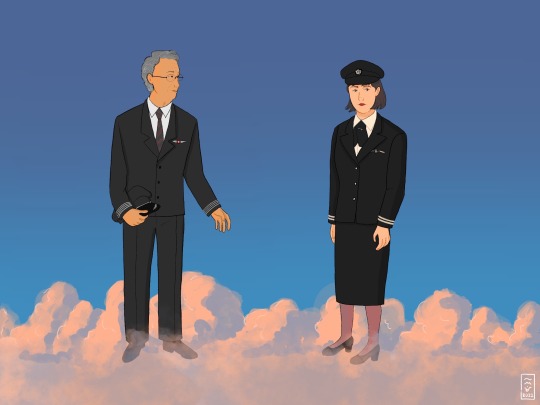
September started sweet Then winter got so mean The fruit left on my sheets If I could do it all again, I would’ve said—
the zurich au, shipwright & fairbairn remix. thoughts below.
this piece (as does most of shipwright & fairbairn’s overall Vibe) took a lot of inspiration from magdalena bay’s “chaeri” (strobe warning for the video).
youtube
i wrote a little bit about it here, but in my idea of lucy @sircarolyn’s zurich au, herc going to switzerland directly pushes linda out of a job. in my head, herc makes a promise to linda that he will help her as much as he could, and then… doesn’t. he leaves without saying anything. it’s schrodinger’s friend breakup: is it over? is it not over? there’s a liminality between them here, which is a lot like the idea of flight itself, and a lot like many of the wide shots in the music video.
almost in retaliation, i envision linda joining air england (which is. basically british airways but shh). by her living her life by spite, the air england move is a bastardization of the worst kind. she knows what this must mean to herc, whom she still shares a sky with. and they do bump into each other in my head, and herc is sorry, but he broke what was built in trust, and linda tore it down the rest of the way.
the visual of herc extending a hand to linda, and her utterly rejecting it, is central to the AU. in my head, he raises a hand to fix her ribbon pin on her tie. she raises a hand and slaps him away. the trust is broken. can it be fixed?
#cabin pressure#em draws#shipwright & fairbairn#can i scream now? i’m gonna scream. AAAAAAAAAAA#I NEED TO WORK ON BACKGROUNDS MY GOD.#ALSO IVE BEEN TRYING TO FIGURE THIS OUT FOR WEEKS. FUCKING WEEKS!#OUGHHHH FINALLY I DID IT
19 notes
·
View notes
Text
(Un)civil part 11 of 28
A FACE-family-centric (heavily centered around the North America twins) retelling of the American Civil War, told in 28 parts through anecdotes, letters, and telegraphs. Rated for language, themes of and depiction of death, other dark historical themes.
FF.net | Ao3
Tumblr: Part 1, Part 2, Part 3, Part 4, Part 5, Part 6, Part 7, Part 8, Part 9, Part 10
-------------------------
September 6, 1862
Letter from Sir Arthur Kirkland in London to Matthew Williams in Quebec
-------------------------
My dearest Matthew,
I hope this letter finds you well. By the time you receive it, I'm sure the seasons in Quebec will have turned solidly towards Autumn, a time I know you cherish and loathe in equal measures. I hear from the governor that this year's harvest has been full and largely unspoiled—it is no small feat, and I congratulate you for this victory in such dark times. I enjoyed seeing your personal gardens outside the city last I visited, and hope your homestead has shared in your countrymen's good fortune this year. I must take a selfish moment to ask that, should you have room in your cellars, you set aside a case of McIntosh apples for me. If you are willing to indulge me even further, I would very much like a cutting of the same tree. I've three young apple trees on my property in Somerset that are now just the right size for grafting. I'm afraid I've spoken high praise of your apples to the gentlemen of Parliament, and not a few have reprimanded me for bloviating about such confections when I have none to share.
I should like nothing more than to spend the rest of this letter imparting news of my own orchards—McIntoshes I have not, but I daresay this years' first scrumpy has been particularly good, and strong too, thank God—but unfortunately my main reason for writing to you is not cider, but something far more grave. It is with neither relish nor pleasure that I remind you of your brother's war, and the potential threat it poses to the Empire. I know it is a constant source of worry for you as well as your governors, just as it is for me in London.
You may have heard, whether by maritime rumor or some other propaganda, that the Confederates have successfully courted Victoria and her government and lured her into supporting their rebellion, but I reassure you these notions are unequivocally false. Lord Palmerston has made very clear his intention to stay neutral in the conflict, so long as it is earthly possible.
However, I must regretfully confirm another rumor that you may have heard, that an English shipwright manufactured one of the Confederacy's newest cruisers. She left British waters as the Enrica, but has been for the last few months terrorizing the Azores as the C.S.S. Alabama, a thorn in the side of Union merchants and a blight on my own efforts for complete neutrality. In equal measure of regret, I must confide that your brother is, apparently, aware of the ship's origin. Should retaliation cross his mind, it is not impossible that he choose to inflict his ire upon you. Your proximity to him is, as it ever has been, a potential danger. This uncomfortable truth forms the crux of my letter to you.
It cannot have escaped your imagination why the Empire has so long remained neutral in the American war. If it were I alone affected, Palmerston would have no doubt sent me across the Atlantic, musket in hand, to fight your cantankerous brother upon the first whiff of a blockade. However, there is considerable worry here in London that, should we give even the illusion of British support for the Confederacy, the United States will turn its eyes northward and violate your border. I realize you and Alfred have shared close and amicable relations for many decades, but I must remind you how war changes nations even more profoundly than men. Alfred is not himself, and may not regain himself for some time. I must ask, though I know it is a herculean task, that you set aside your feelings for your brother and prepare yourself for imminent invasion. Should the United States seek to annex Canada or any of our other colonies while still at war with the Confederates, I fear not only for your own safety, but the safety of whatever men Lincoln will seek to conscript from your undepleted barracks.
While you call your own men to arms and fortify where you can, I must ask that you keep your own person away from all things military. Neutrality is as much a show as it is a diplomatic condition, and you being as far away from the fighting as possible will keep your peoples' minds turned away from war. I was heartened to hear of the incorporation of the city Victoria on your western coastline on Vancouver Island. Do your trains yet reach so far west? I imagine the oncoming winter would be made more tolerable by Pacific coastal winds. I know Gov. Douglas has recently set aside a handsome estate for you there, though I do not know if you've yet had an opportunity to visit. You will have to tell me if the prospectors are as numerous as I've heard.
It would put my old heart considerably at ease to know that you were doing all you can to keep yourself—and the Empire—from becoming the next casualty of your brother's self-destruction. I cannot impart how sorry I am for asking so much of your heart and spirit once more. I am ever-thankful for you, and hope you may enjoy these first days of harvest in wealth and plenty.
Your Ever-Devoted Brother,
Arthur Kirkland, GBE
-------------------------
Historical Notes:
1. McIntosh is the name of an apple variety developed and made popular in eastern Canada in the early 19th century, and is now the national apple of Canada (yup, that's a thing!). Since apple varieties cannot be propagated from seeds, and must be grafted or rooted from cuttings, Arthur here is asking Matthew for a bit of his own McIntosh tree so he can grow McIntosh apples in England. And yes, the McIntosh apple is in fact the inspiration for the name of the modern computer company!
2. "Scrumpy" is a term that probably didn't show up in the English language until about 1904, but I've adopted the term here because it means something very specific to which Arthur is referring. (Hard) apple cider has been a popular drink in England for centuries, but the southwest of England is known for a particular kind of apple cider that is now called scrumpy. Compared to the more refined "export" varieties of cider manufactured at the same time, scrumpy was and is simple, dry, less sweet, and usually still (not carbonated). These roughly-made farmhouse ciders were both easy to make and also usually a great deal stronger alcoholically than the ciders sold at market. If you're ever in the southwest of England (and of drinking age), I strongly recommend trying it! It's delicious.
3. The C.S.S. Alabama has been discussed already, but just a note here to add that for the first two months of its existence as the Alabama, this ship stayed closer to Europe than America. The Azores are an archipelago of islands controlled by Portugal that are west and to the south of the Iberian peninsula. As a bird flies, they are roughly ⅓ the way from Europe to North America. The Alabama did not cross the Atlantic until a bit later. When it did, it arrived and wrought havoc upon the coasts of New England.
4. Yup, one of the reasons England stayed neutral was, in fact, Canada! There was considerable fear that the Americans would attempt to annex Canada. The fear of American annexation of Canada is actually arguably one of the biggest external factors in Canadian history, and would not end with the end of the civil war. It was not until the early 20th century when fears of American annexation subsided.
5. British Columbia was a brand new colony at this point, founded in 1858 and largely fueled by the booming Gold Rush there at the same time. Though the Colony of Vancouver Island was at the time a separate entity, they were managed by the same shrewd governor, James Douglas. The city of Victoria, which today is the capital city of BC, was incorporated as a city in August 1862.
#hetalia#historical hetalia#aph america#aph england#aph canada#civil war#american civil war#aph france#hws france#hws america#hws england#hws canada#na bros#face family
18 notes
·
View notes
Photo
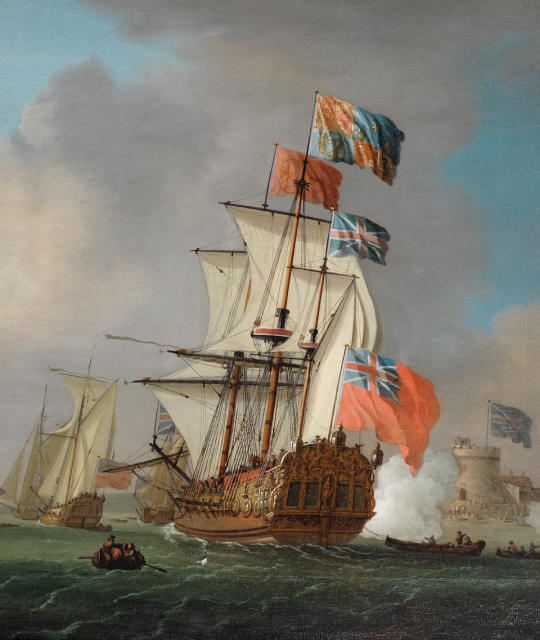
The Royal Yacht Peregrine and a smack rigged Yacht on the Medway off Coast at Gillingham, Kent, with Upnor Castle in the background, detail, by Peter Monamy, possible 1726
Designed by Peregrine, Lord Danby (later the Marquess of Carmarthen) to replace his earlier yacht Royal Transport which had been given to the Russian Tsar Peter (the Great) when the latter visited England in 1698, the so-called Peregrine Galley was built at Sheerness by Master Shipwright R. Lee in 1700. Measured by her builder at 197 tons burden, she was 87 feet in length with a 22½ foot beam and classed as a sixth rate mounting 20-guns. Taken straight into naval service by William III upon completion in 1700, she was not, in fact, specifically classed as a Royal Yacht until after her refit and renaming as the Carolina in 1716. However, such was the success of her design, coupled with the lavishness of her appointments, that she was frequently used as a royal yacht throughout the reign of Queen Anne (1702-14) and was the obvious choice to convey George I to England after his accession. The new King, having travelled to Holland overland from Hanover, boarded the Peregrine at Oranil Polder on 16th September 1714 and, escorted by Admiral Berkeley and a fleet of twenty sail, made the short journey across to the Thames estuary. Sailing up-river to Greenwich, George disembarked there for his carriage journey into London but not before pausing to knight Peregrine’s captain William Sanderson in thanksgiving for his safe arrival. Renamed Carolina in 1716 in honour of the new Princess of Wales – the future Queen Caroline, wife of George II – the Peregrine was later extensively rebuilt and renamed Royal Caroline in 1733. Converted to a sloop and reverting to her original name in 1749, she was last seen in heavy weather in the western approaches on 28th December 1761 whilst en route to the West Indies, after which she disappeared without trace with the loss of all hands.
86 notes
·
View notes
Photo
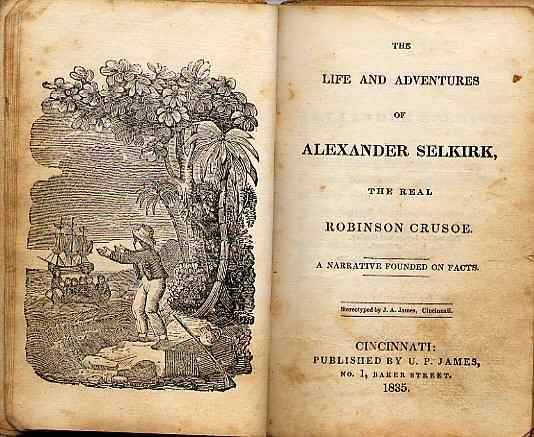
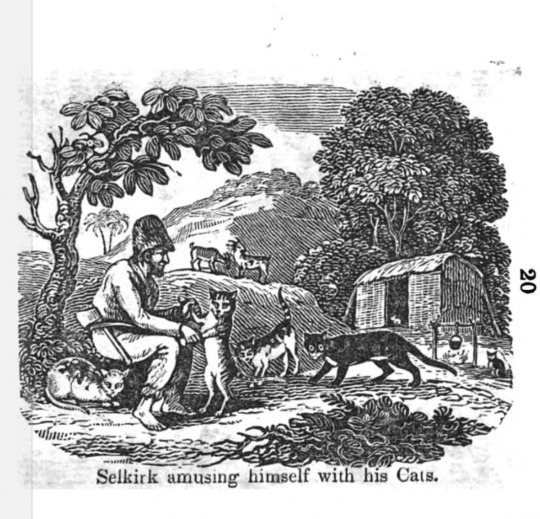
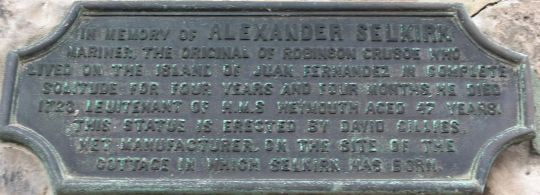
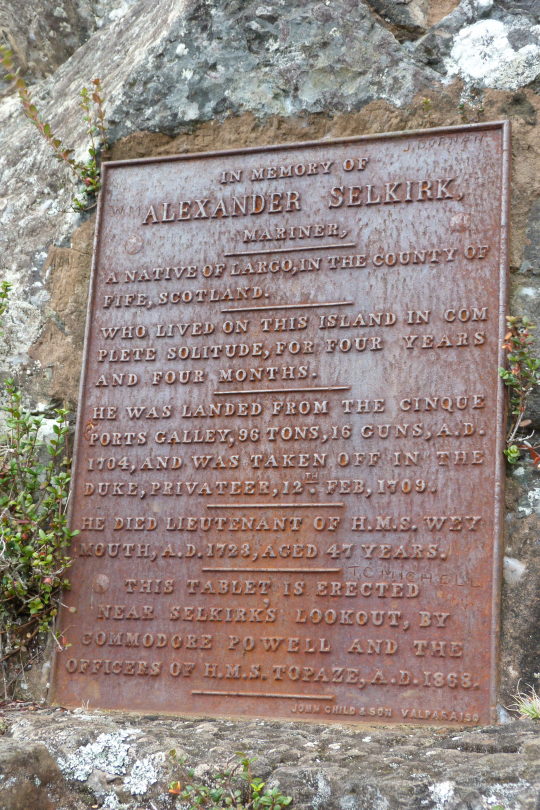
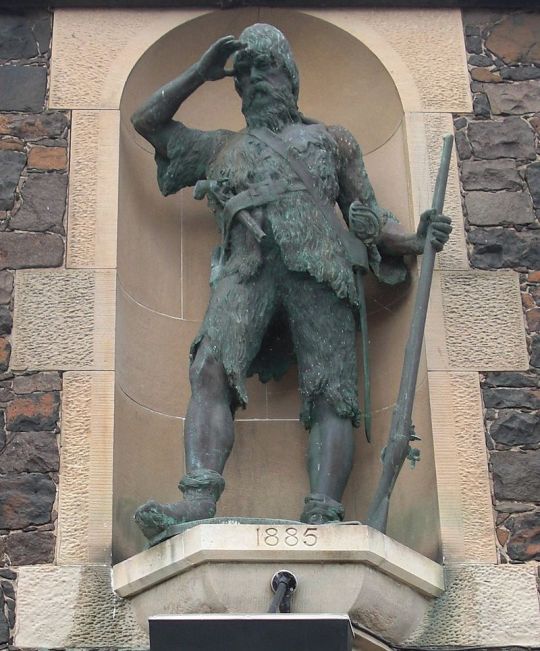
December 13th 1721 saw the death off the coast of West Africa of Alexander Selkirk
Selkirk was the Scot whose experiences inspired Daniel Defoe's "Robinson Crusoe", he was the son of a shoemaker and tanner in Lower Largo, Fife born sometime in 1676.
Young Alex was a quarrelsome character who was often falling foul of the church elders, he liked the usual Scottish pastimes of drinking and fighting and it was in 1693 after an altercation in church he had to flee Scotland, the church records say it was "indecent conduct in church", god knows what he did but the record goes on to say "did not appear, being gone to sea"
He was back in Lower Largo and back in trouble by 1701, this time it was a brawl with his old man and brother, he had to get out of Lower Largo or would probably end up at the end of a noose, so what better occupation for a wayward laddie of Alex's nature than to become a Pirate. Well not quite a pirate, a Privateer which was the nearest thing to being one, it was legalised Piracy where a Merchant ship could attack and take the spoils from enemies of whatever country authorized, in this case it was an English ship called Cinque Ports and they were involved in the War of the Spanish Succession, so they were after French and Spanish ships mainly in the South Atlantic.
Anyway after a few years of plundering Selkirk and the crew had pulled into an island called Más Afuera , four hundred miles off the coast of Chile. Selkirk once again showed he was a handful and argued with the ship's captain, Thomas Stradling, that the ship wasn't seaworthy and they should make repairs before departing.
Tempers flared, and Selkirk said he'd rather stay on the island himself than risk being on a sinking ship. Stadling duly obliged leaving him on the island with a few supplies, including a musket, gunpowder, and a few tools.
Oor Andrew initially stood fast, hoping the crew would side with him. When no one else did, he begged to be let back on the ship, but to no avail. He must have looked on despondently as the ship sailed away.
On the surface, Más Afuera was a great place to be stranded. Meat was readily available in the form of wild goats and spiny lobsters. A freshwater stream ran through the island. Wild cabbage, pepper, and plums grew in the jungle. There were no predators or dangerous animals, and probably the most important thing for him, nobody to argue with!
The early months, however, proved difficult for Selkirk. He sank into depression, and rarely bothered to pursue the food all about him. It's said that at night, rats would crawl into his shelter and bite his feet.
After months of listlessness, Selkirk came to accept his fate. He domesticated wild cats to keep the rats away and provide company. He began hunting goats on the island and grew adept at running them down. His feet grew tough and calloused from running over the land barefoot.
Selkirk had another advantage. His father had been a tanner, and Selkirk learned how to tan hides at a young age. He used this skill to make clothing out of goat skin.
Over the next several years, Selkirk came to embrace his solitude. The only interruption he encountered was when a Spanish ship landed on the island. Selkirk fled from them and hid up a tree as the away party passed underneath. To pass the time, Selkirk supposedly read the Bible, sang, and prayed the days away until he was finally rescued his long-awaited deliverance came on 2nd February 1709 when two privateering ships, the Duke and Duchess stopped off at the island.
Thomas Dover led the landing party that met Selkirk. After four years and four months without human company, Selkirk was almost incoherent with joy. The Duke's captain and leader of the expedition was Woodes Rogers, who mischievously referred to Selkirk as the governor of the island. The agile castaway caught two or three goats a day and helped restore the health of Rogers' men, who were suffering from scurvy.
Rogers wrote an account of his expedition, A Cruising Voyage Round the World, it provided the earliest written accounts of Selkirk’s adventure and served as the basis for many other literary works inspired by Selkirk, including the most famous of them Defoe's Robinson Crusoe. Not only did he get a book based on his life, but in the end, it seems Selkirk got the final I-told-you-so. The ship that he deemed not seaworthy and refused to board did end up sinking, killing almost everyone on board except Stradling, who ended up in prison. He ended up in England in 1712 and after a few months in London, he began to seem more like his former self again. In September 1713 he was charged with assaulting a shipwright in Bristol and may have been kept in confinement for two years He returned to Lower Largo, where he met Sophia Bruce, a young dairymaid. They eloped to London early in 1717 but apparently did not marry. He was soon off to sea again, having enlisted in the Royal Navy.
While on a visit to Plymouth in 1720, he married a widowed innkeeper named Frances Candis. He was serving as master's mate on board HMS Weymouth, engaged in anti-piracy patrols off the west coast of Africa, when he died on 13 December 1721, succumbing to the yellow fever that plagued the voyage. He was buried at sea.
There is a statue in Lower Largo and a plaque that reads
"In memory of Alexander Selkirk, mariner, the original of Robinson Crusoe who lived on the island of Juan Fernández in complete solitude for four years and four months. He died 1723 Lieutenant of HMS Weymouth, aged 47 years. This statue is erected by David Gillies, net manufacturer, on the site of the cottage in which Selkirk was born."
A plaque was also erected on a rock on Más Afuera, which has now been remaned Isla Alejandro Selkirk/ Alexander Selkirk Island.
15 notes
·
View notes
Photo

JOHN HARTNELL, A.B.
(1820 - 4th January 1846)
John Hartnell was born in Gillingham, Kent to Thomas Hartnell, a shipwright, and Sarah Hartnell (née Friar), and was baptised at St. Mary Magdalene Church on 16 July, 1820. The eldest of five children and from a long line of shipwrights and sailors rooted in Devon, John grew up in an area of Gillingham known as East Row, close to the River Medway and in the shadow of the Chatham Dockyard. In 1832, when John was twelve years old, his father passed away, leaving behind a widow and five young children, including John’s newborn sister, Betsy. Presumably under financial pressure, John was later apprenticed as a shoemaker under a man named Henry Sarge, and would remain in this job until late 1841.
John was quite close to his younger brother, Thomas, who had joined the Royal Navy at fifteen years old. In 1841, Thomas returned from the First Opium War in China aboard the HMS Volage, along with later Franklin Expedition Lieutenant Graham Gore, and John Strickland, possibly a cousin of the Hartnells. What followed is lost to time, but by September of 1841, John Hartnell had quit his job as a shoemaker and enlisted in the Royal Navy aboard the Volage as well. This decision may have caused a small rift between himself and his mother, as he allotted his wages to his younger sister, Mary Ann.
Regardless, John would serve on the Volage for three years as an Ordinary Seaman under Captain William Dickson, travelling to the West Indies and finding ports of call in Canada, Jamaica, Mexico, and Barbados among others before returning home in early 1845. His time on the Volage also gives a rare descriptor of his appearance in the Description Book in 1842, as he’s described as being 5′11″, with black hair, hazel eyes, and “sallow” skin. For a young man who had rarely seen much outside of Kent, this journey must have been an exciting one, as upon his return, he - as well as Thomas Hartnell and John Strickland - wasted little time in enlisting for their next journey aboard the HMS Erebus as part of the Franklin Expedition. All three were enlisted as Able Seamen (ABs) and were healthy enough to be allowed to continue their journey past the last known sighting of the Expedition in July of 1845.
John, however, would go on to achieve accidental fame through his illness and death. By November of 1845, after the Expedition had taken its icebound quarters on Beechey Island, John had fallen deathly ill from a possible combination of tuberculosis, pneumonia, and a severe zinc deficiency. Later forensic investigation would also show that he had an infection in one of his feet, an injured ankle, a compressed cervical vertebrae, and an injured shoulder. His health rapidly deteriorated, and on the 4th of January, 1846, John Hartnell passed away at the age of 25. He was the first man on Erebus to die, and the second man of the Expedition, passing away only three days after 20-year-old lead stoker, John Torrington. John Hartnell’s body was clothed in three shirts - including one belonging to his brother, Thomas, which was embroidered with ‘T.H. 1844′ on the shirttail - and a wool cap. He was laid out on a folded blanket with his head resting on a hand-sewn pillow, and was wrapped in a shroud. His grave on Beechey Island, along with those of John Torrington and Royal Marine William Braine, would become landmarks along the search for the Franklin Expedition.
John Hartnell was exhumed once in the 1852 by Inglefield & Sutherland, again in 1984 by Owen Beattie of the University of Alberta, and once more by Beattie in 1986. The 1986 exhumation revealed John’s almost perfectly-preserved body, aside from a damaged coffin from the 1852 attempt as well as a damaged right eye and arm. He became iconic for his full head of dark hair and his supposed “angry” expression, with one researcher commenting, “This guy is spooky, the quintessential pirate. This guy is frightening.” Another wrote that he looked as though, “he were shouting his rage at dying so early in his adventure.” What struck the entire team, which included John’s great-grand nephew, was how young he had been at his death, and how ill he must have been toward the end. One of the most notable finds of his exhumation was the inverted Y-incision on his abdomen, proof that he had already been autopsied, more than likely aboard Erebus.
While John Hartnell’s body allowed for a window to be open into the past and to help in the understanding of the fate of the Franklin Expedition, it’s important to not overlook his life as well. Contemporary sources paint the Hartnell family as tight-knit, with John being particularly close to his brother, Thomas, and sister, Mary Ann. John himself appears to have been hardworking, kind, and driven, if not a bit stubborn and accident-prone.
Although there are few firsthand sources and none written in his hand, letters from his mother and brother, Charles, show how deeply his absence was felt. In a letter written to him and his brother by their mother, she says, “my Dear children if it is the Lord’s will may we be spared to meet on earth if not God grant we may all meet around his throne to praise him to all eternity is the Prayers of your Affectionate Mother”. In a letter dated 23 December, 1847 (over a year after John’s death), his brother Charles writes, “it is nearly three years since we parted but I hope it will not be that time before we meet again”.
#franklin expedition#john hartnell#hartnell family#happy birthday john!!!#the rule of thumb where he lived was that a child was baptised two months after they were born which is true for thomas so#may 16th makes sense for john
148 notes
·
View notes
Text
The Great Michael - the giant Scottish Crusader Warship
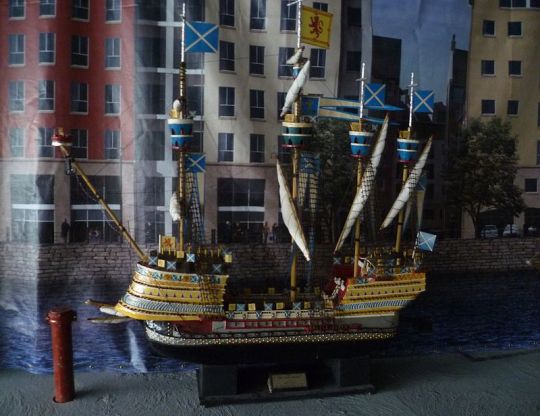
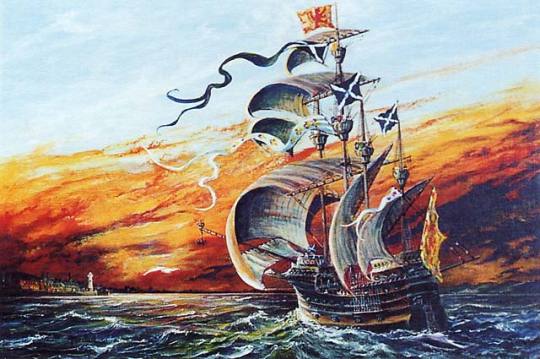
Michael, popularly known as Great Michael, was a carrack or great ship of the Royal Scottish Navy. She was the largest ship built by King James IV of Scotland as part of his policy of building a strong Scottish navy.
She was ordered around 1505 and laid down in 1507 under the direction of Captain Sir Andrew Wood of Largo and the master shipwright Jacques Terrell, launched on 12 October 1511 and completed on 18 February 1512. She was too large to be built at any existing Scottish dockyard, so was built at the new dock at Newhaven. When Michael was launched she was the largest ship afloat, with twice the original displacement of her English contemporary Mary Rose, which was launched in 1509 and completed in 1510.
The poet William Dunbar wrote of her construction:
.....................carpentaris, Beildaris of barkis and ballingaris, Masounis lyand upon the land And schipwrichtis hewand upone the strand.
— William Dunbar, "To the King [Schir, ye have mony servitouris]" Translation:
Carpenters, Builders of barks and ballingars, Masons lying upon the land, And shipwrights hewing upon the strand.
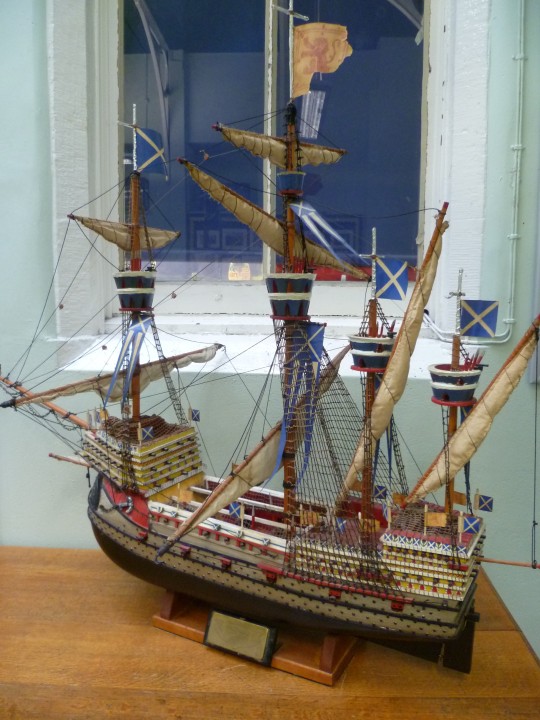
The chronicler Lindsay of Pitscottie wrote of the building of Michael that "all the woods of Fife" went into her construction. Account books add that timbers were purchased from other parts of Scotland, as well as from France and the Baltic Sea. Lindsay gives her dimensions as 240 feet (73 m) long and 35 ft (11 m) in beam. Russell (1922) notes that Michael was supposed to have been built with oak walls 10 ft (3.0 m) thick. She displaced about 1,000 tons, had four masts, carried 24 guns (purchased from Flanders) on the broadside, 1 basilisk forward and 2 aft, and 30 smaller guns (later increased to 36 main guns), and had a crew of 300 sailors, 120 gunners, and up to 1,000 soldiers.
Henry VIII of England was unwilling to be outdone, and ordered the building of the 1000-ton Henry Grace à Dieu, launched in roughly 1512, later known as Great Harry, which was even larger. These ships were the first great ships, the precursors of the later ship of the line.
Michael was named after the archangel Michael and built to support a Scottish crusade against the Ottoman Empire to reclaim Palestine for Christendom. This grandiose plan had to be changed when the commitments of the Auld Alliance with France required Scotland to go to war with England, to divert England from her war with Louis XII of France (see the Italian Wars).
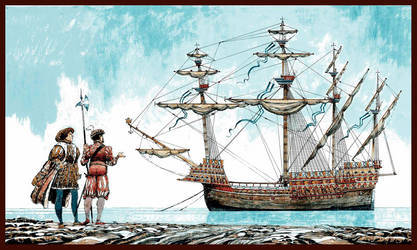
In August 1513 a Scottish invasion force was assembled to attack English possessions in France. Commanded by James Hamilton, 1st Earl of Arran, the chief ships were Michael, Margaret and James. Instead of attacking the English, Arran raided Carrickfergus in Ireland and returned with loot before proceeding to France.
A warship of this size was costly to maintain, particularly for a small country like Scotland. After James IV and many of the nobility of Scotland were killed at the Battle of Flodden in September 1513, Michael was sold to Louis XII of France on 2 April 1514 for the bargain price of 40,000 livres and became known as "La Grande Nef d'Ecosse" (The Big Nave of Scotland) (Nave is from the medieval Latin navis, meaning 'ship'). In March 1514 Michael was reported to be docked at Honfleur because she was too big for the harbour at Dieppe. Most historians have accepted the account of the Scottish historian George Buchanan that after this, the French allowed her to rot at Brest. Norman MacDougall in 1991 suggested that under her new French name, she may have been used in the French attack on England in 1545 that led to the sinking of the English warship Mary Rose in the Battle of the Solent on 19 July 1545.
126 notes
·
View notes
Photo
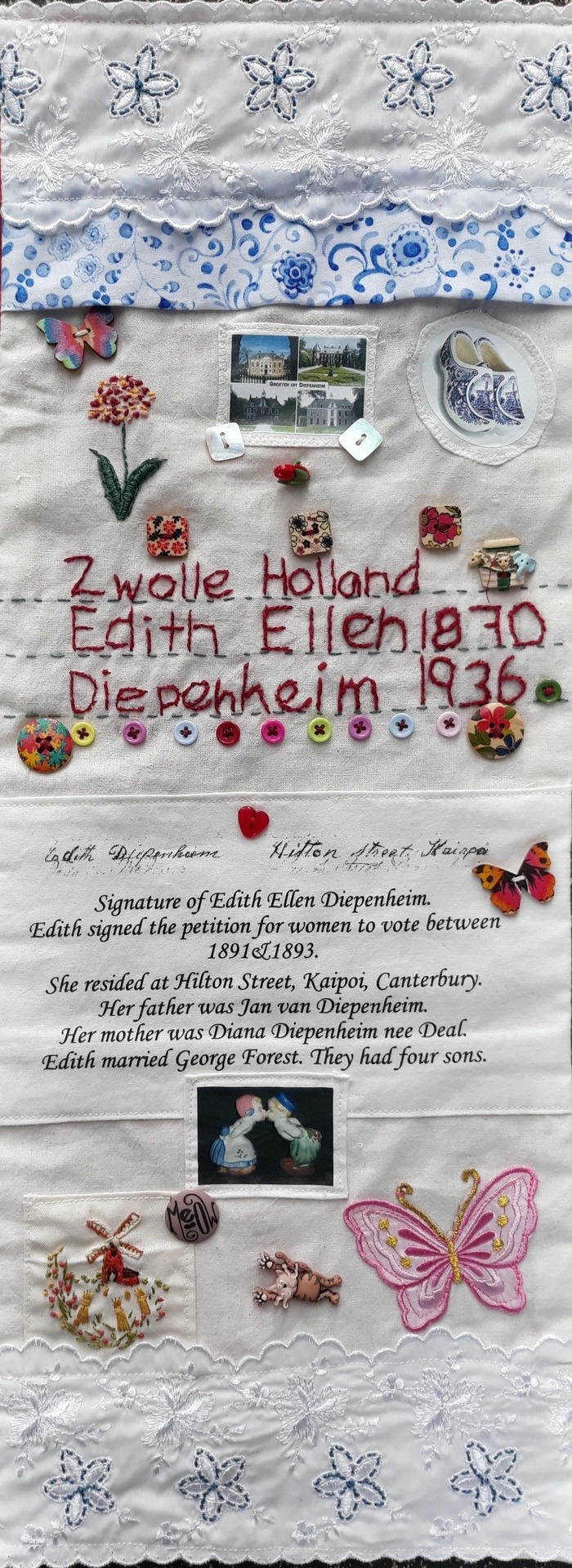
Maker’s name: Margaret Diepenheim
Petition sheet number: 258
Person honouring: E. [Edith Ellen] Diepenheim
Relationship to maker: Great-aunt
Edith EIlen Diepenheim was born in 1870 in New Zealand.
Her parents were Jan/John van Diepenheim, a shipwright born in November 1830 in Zwolle Netherlands and Diana Diepenhiem [born Deal]. Edith’s mother came from England to New Zealand on the Egmont in September 1856, arriving in Lyttelton when she was 16 years old.
Edith signed the petition for women to vote 1891–93. She signed the petition on sheet 258, which is a light signature.
Edith was employed as a dairymaid. She married George Forrest. They had four sons and lived at Hilton Street Kaiapoi, Canterbury.
Edith died in 1936 at the age of 66 years.
Panel materials: Mixed media.
Unique ID number: VRS.2019.EX1
3 notes
·
View notes
Text
Keep On Rising (Until the Sky Knows Your Name) 01
Found Family | Zavala is Tower Dad | Father-Daughter Relationship | Childhood Trauma and Recovery | Canon-Typical Violence | Amputation
A story about how an orphaned Amanda Holliday comes to belong in the Last Safe City and the family she finds along the way.
(Or, the story of how Commander Zavala finds himself responsible for one Amanda Holliday.)
-/
"The poor dear is in her bunk," The matron says with a sad smile. "We've considered moving her to one of our rooms for the time being," She continues, handing him a mug of tea. It's far too strong for his tastes, but he is certain the caretakers here need the added fortitude. He sips at it politely, trying not to grimace at the taste. "Barely comes out for meals, only when someone forces her - and she hides half of what we give her." She frowns. "Every sound she hears makes her jump. Miss Evanliegh found her under her bed after a nightmare, whimpering about Fallen-" She notices he's made a bit of a dent in his tea, pulls the mug from his hand with a surprising amount of force, and tops it off before he can stop her. "Commander, it's probably best if you didn't visit with her."
Zavala nods, trusting her expertise. It's his only free day this cycle. Like his peers, he too had activities - civic duties - he saw to in his downtime. Some, like Cayde, chose a preorganized activity to oversee - he's made it a point to ruin any and all pick-up sports in the city as of late. Meanwhile, Zavala prefers spending his time in the City's many orphanages.
But not just any of them. He focuses on the ones not backed by factions or philanthropists. The ones that children get sent to when they turn up in the Last Safe City unclaimed, when they turn up on the streets without any ties to a community or place. The latter is far more common: the number of refugees has declined in recent years, and the number of orphaned children is very slight. In fact, it's been nearly a century since an orphaned child had made it to the City from beyond the walls. Most of the children here were born on the streets in the slums, found by kind-hearted people ill-equipped to take care of them.
He nods, only half listening to the matron's babbling. Karena, the head housemother, was clearly moved by this child's misfortune. "....they found was toppled over miles away… that she'd walked so far was quite remarkable."
The mug stops halfway to his mouth. "What?"
"Didn't you know?" She turns back to the kettle on the counter, but she rinses it out instead of pouring him more. He says a silent prayer of thanks to the Traveler. "She was the only one of her group to survive. One of your fireteams found the convoy miles back. Looks like they'd been without food for some time, probably fed the girl whatever they could. Never would've stood a chance against the Fallen, rest their souls…" She tsks.
The Commander pushes back his mug and looks to the red and white blanket folded up beside him, patting it once with a firm hand. There is a gravity to his downturned gaze. "It would be for the best if you gave this to her," He admits. "If there is anything I can do…"
"Oh, no, never you mind, Commander." She waves a hand, giving him a gentle smile. "She'll be alright. It just takes a gentle touch."
-/
The children are always happy to see him. Places like these don't often get visitors, especially not the kind that don't require them to market themselves to a prospective adopter. They get to run and holler and simply be, some choosing to follow him around like lost ducklings, others content to wave in a greeting and carry on independently.
Of course, of all the times he's come here, the biggest event of the day is always supper. Even the most standoffish of children fight to sit beside him at the table. Today is no exception.
So, instead of sitting in one place for the duration of the meal, he moves around, making sure to spend time with each of them. Most of the time it involves mild babysitting, making sure no one is stealing anyone else's desert or lobbing unwanted vegetables at their dorm-mates when they think he isn't looking.
If he's to be honest, it's hardly different from Consensus meetings. And the company is far more tolerable, for the most part.
When he's almost to the end of the table, toward the end of the meal, there is a sound, a thump above them like something's fallen to the floor, a muffled scream. Then, more footsteps, like a herd of elephants descending the stairs. One of the caretakers, a man who had been off in the kitchen, sets after them, already yelling.
"We were looking for Hilda," One of the boys responds, defensive without being prompted. "We didn't know she was in there."
The housefather puts both hands on his hips. "You didn't know," He says with a shake of his head. "She's been in the same room since she's got here, and you all visited Hilda in the infirmary this morning." He sighs. "Karena is with her now. She won't like it when I tell her about this."
The three boys pale. The housefather turns them around, ushering them towards the kitchen. "I was going to bring her dinner," He sighs, "But it will have to wait. The three of you will sit with me in the kitchen until the head matron returns. We will be having a discussion about this."
A chorus of downtrodden groans meets him in reply, but the caretaker does not relent. Instances like this were quite common in places like this. Among children in general, really.
The Commander rises from his current seat at the end of the table when the meal recommences, the children quick to discuss the boys' impending punishment and their disdain of the new girl who gets every meal brought up to her. He strides from the dining area to the industrial kitchen, fixing the unruly children with a look he'd too often given a wayward Hunter.
The housefather turns to him immediately, looking a bit surprised to see him there. "Commander, do you need something?"
"You said you were planning on bringing her a meal?"
"I was, but I doubt she'll eat now," He too gives a withering glare toward the children. "It's alright. I'll take her up something a bit later." He rubs the back of his head. "We usually leave it on the dresser. She, uh, doesn't really engage with us."
One of the children sitting at the kitchen counter comments loudly, “Even Miss Karena is fed up with it. I heard her! And she’s been doing this for a million billion years!"
The smooth baritone of the Commander cuts through the exasperated commentary. "I don't mind.”
“Well, she hasn’t eaten all day, that I know of.” The man turns back to the counter, producing a plate with a cover to keep it warm. “If you really don’t-”
“Of course not.”
“Second floor. Third door, on the right,” He hands the Titan the plate on a tray, with a juice-box and cutlery. “Don’t be surprised if you frighten her. It’s not you, she’s just-”
He nods, solemn. “Karena told me.”
“You have my thanks.” With that sorted, the worker regards his charges. “These three will have to wait for their assignment from Miss Karena. Since our new addition is feeling a bit shy, I think we’ll be writing our apologies, wouldn’t you say?”
Their childish grumbling is loud enough for him to hear all the way up the stairs.
-/
He makes sure to step both lightly but not silently as he approaches the room. With the back of his index and middle fingers, he raps his knuckles gently against the door. After a moment of balancing the tray in a single hand, long enough to hear the sound of rustling on the other side of the door, he edges it open just a small amount.
At this point he realizes that he does not know the child's name. Not that it matters. He steps into the room, leading with the tray. The orphanage has nearly identical rooms for all it's inhabitants. Bunk beds in one corner of the room and twin dressers against the opposite wall. One half of the room is decorated in a child's drawings: some taped to the ceiling and walls by the top bunk. One dresser has a small pile of books and a few plush animals on it.
It doesn't take much to recognize that the more lived-in part of the room belongs to the girl in the infirmary. He sets down the tray atop the empty dresser, casually wondering aloud if she'll be able to reach it.
He goes unanswered. The lower bed she occupies creaks - it's very old - as the child presses herself back against the far corner, all but wedged against the wall in a trembling heap of blankets. He notes with a small sense of pride that the one he'd made - the one he gave to every child upon their arrival - is on top, little fingers threaded between the stitches.
Beach-glass eyes, a kind of green similar to a stormy sea, watch him in wary resignation. When he turns toward her, tray still in his hands, she whimpers and draws the covers around herself further, pressing herself against the corner where the frame meets the wall.
"It's alright," He murmurs, careful not to make eye contact, lest he scare her more. "I just wanted to make sure you could reach your supper."
Against her will, her stomach gurgles loudly. She flushes but doesn't make a move for the tray.
Zavala does his best not to sigh, instead lifting the lid designed to keep the plate hot, moving it away. At first he's surprised about the small portion she's been given, but remembers what the matron had said, about her party suffering from starvation. Though she has the blankets pulled up to her face, he can see the dark circles under her eyes, the gaunt lines of a child who knows hunger far too intimately. It makes his chest ache with an overwhelming sadness.
He reaches for the small juicebox next, looking away, pretending to be disinterested.
She reaches out, snatching the small dinner roll next to a tiny helping of stew, pulling it into her chest, into the relative safety of her nest of blankets. Wide, fearful eyes meet his when he looks back, blinking in surprise, as if his incredible sense of awareness hadn't allowed him to witness the whole thing.
The child blinks back blankly. Panic, an array of mixed fight-or-flight synapses all firing at once... a paralyzing terror is etched into her very being. Though she trembles with it, she does not cry. He smiles at her, a small thing, mostly with his eyes, taking a knee beside the far edge of the bed.
"It's alright to be afraid," Zavala intones, very gently. "This is all very new. There are so many dangers, outside the walls-" She makes a squeak and the Commander immediately shifts gears, "But you are here now. You will be safe in this City. I promise."
She squeezes her eyes shut at that, shaking her head in a tiny negative.
"No?"
For the first time in a long time, his words bring no comfort. None of his attempts to soothe her work, and her dinner is long since gone cold when he takes his leave (though he can tell by her distrust, she won't touch it). It physically pains him to shut the door behind him, to hear the child finally sob brokenly to herself, muffled by blankets, unable to be consoled for anything.
The matron pats his shoulder when she walks him out. "You have a kind heart, Commander. Don't take it too personally. She'll come around."
-/
He doesn't make it back to the orphanage until the fall. It's been nearly three months since his previous visit, and the children are beside themselves, vying for his attention. Three of them have been adopted, another two have gone off, applying for their own housing now that they've grown old enough to secure jobs.
The entire time, he watches for a hint of the little girl from his previous visit. The child had weighed heavily on his mind, even months later. He'd looked into what happened, read the report from the Fireteam that happened on the little girl miles from the overturned vehicle ransacked by the Fallen. Things like these always hit close to home, for reasons he never quite fathomed.
Much later in the day, following an early supper (and the usual carrying on that came with it), he catches sight of a shadow on the staircase that leads to the dormitories. He's reading a book to several of the youngest children, all of whom fight over who gets to turn the page for him. When he looks back again, it's gone.
He says his goodbyes to the houseparents, thanking them, as always, for their dedication to providing a healthy environment for the children. He almost doesn't recognize her, fidgeting slightly, fingers curled around the trim of the door frame.
The caretakers look surprised, all of them watching her carefully. Karena dutifully crouches down half way, looking at her maternally.
"Yes dear, what is it?"
Those eyes find him instead of answering. In the light, he can see how they're almost as blue as they are green. She looks nervous, but not terrified. "I jus'," The girl steps into the room, carefully, making a complete sweep of it with her eyes to assess for danger before continuing. "Jus’ wanted ta' say thank you," She drawls. Her cheeks turn pink, highlighting a sprinkling of freckles across her cheeks and the bridge of her nose. "Fer' the blanket."
Karena keeps the surprise from her face, but her cohorts are not nearly as reserved.
He turns slowly toward her and crouches down so that he's only a little taller than she is. "You are very welcome…" He tilts his head, still, after all this time, not knowing her name. It had never made it into the strike reports.
"Amanda," She whispers bashfully. "Amanda Holliday."
The smile he gives her makes her gasp, his bright irises almost twinkling as he regards her. "It's a pleasure to meet you. I am Zavala."
She toes the edges between floorboards with a worn boot. "They say yer in charge ‘round here. ‘N the City," She finishes, between nervous and maybe awed.
He chuckles. "Is that so?"
Amanda nods, looking down.
Despite flinching, she doesn't shrink back when he puts a hand on her head, ruffling her blonde hair. "Next time I come by, I hope you'll visit with me."
"I c'n do that," She whispers.
His voice is warm, and when he withdraws she looks up, almost conflicted. Upset that he'd withdrawn contact. "Good," He tells her. "I look forward to it."
#destiny fanfiction#shipwright september#amanda holliday#commander zavala#zavala is tower dad#prepare for feels
22 notes
·
View notes
Text
So... I’m back. Well, sort of. As I said a couple of days ago I’ll be properly back in mid September but I’m starting to tidy up my things around here. So, a couple of things before I go diving into the marvelous realm of Eren You Should Really Be Updating Your Blog Right Now:
-I’ll be going private and selective, for my own sanity. Anyway if you hit me up with something, chances are I’ll be totally down for whatever you said.
-Also, the semi-hiatus state will not change. I’ll likely have time to hang around here in the evenings/nights, but you know how a brain tends to function after a long day of work. So please bear with me.
-That said, I might be able to log in three days in a row, then go completely AWOL for a whole week. Who knows. Anyway I’m always reachable through the IM/ Discord (if you’re a mutual, you’re welcome to ask for my alias there) though I might not be able to answer straightaway.
-I know I really shouldn’t be doing this but who cares, Eren, who cares. I might be adding a Guest Muse page for muses I need/ feel like writing (hello there, Shipwright the Shipwright), as well as for OCs I’ve written about in my threads.
-I’ll try to clear my inbox and to do something with my drafts in the following days, so you can expect some very rusty replies (?).
-To keep things clear, all the shitposting and non-rp related stuff will go to this side-blog: @scionofqueens
And that’s all. Ereinion is waving his hand at you like the good boy he is, he’s missed you all lots.
#Eren was NOT an Elven Queen (ooc)#tbd#maintenance#In fact I hope to be able to be here in early September#but as soon as i finish this giant commission I'll be able to be around here on a regular basis
11 notes
·
View notes